I know several people who are paying ridiculous amounts of money each month on keyword tools that are simply a waste of money! Most of the features they are using on their $100 a month keyword tools are the same features KeySearch provides.
To be as transparent as possible, I am an affiliate for KeySearch and if you click this link and use the code DSDISC, I receive a small commission and you receive 20% off.
I could be an affiliate for any of the keyword tools out there and KeySearch has the smallest keyword tool commissions so it’s detrimental to me to recommend KeySearch to you. I recommend it because it’s the best value Keyword tool available in my opinion.
What is KeySearch and What Does it Do?
KeySearch is one of the many keyword tools out there. If you own a website of some kind, chances are a keyword tool can help you. There are several features you can utilize but I’ll list the main ones most likely to help you:
- Keyword research – search volume, ranking difficulty, CPC, PPC.
- Search trends of 12 months.
- SERP analysis
- Provides a list of long-tail keywords within your niche.
- Domain analysis – backlinks, organic keywords, top competitors, referring anchors and more.
- Competitor analysis.
- YouTube research
- Rank tracking
- Much more.
If you’re struggling to come up with topic ideas to write about then KeySearch will definitely help you. Simply type in a keyword within your niche and scroll down the list of related search terms and common questions people search for.
This not only provides a list of articles you can write but gives you ideas for other articles that you can branch off from.
Is KeySearch the Most Affordable Keyword Research Tool?
Technically no, just about every keyword tool has a free version you can use if you only want to do a couple of searches. The problem is the free versions often provide you with limited information.
With KeySearch, the Starter Plan will be the best option for most users. It gives you 200 searches each day and it’s unlikely you will require more than that. The Pro Plan won’t be necessary for 90% of people so just stick with the Starter Plan and you can upgrade if you need.
The Starter Plan is $17 per month with the ability to cancel whenever you choose. Alternatively, you can pay annually for $169 which works out to just over $14 a month. However, if you use this link with the code DSDISC you’ll receive 20% off which brings the price down to $13.60 a month or $135 for the year.
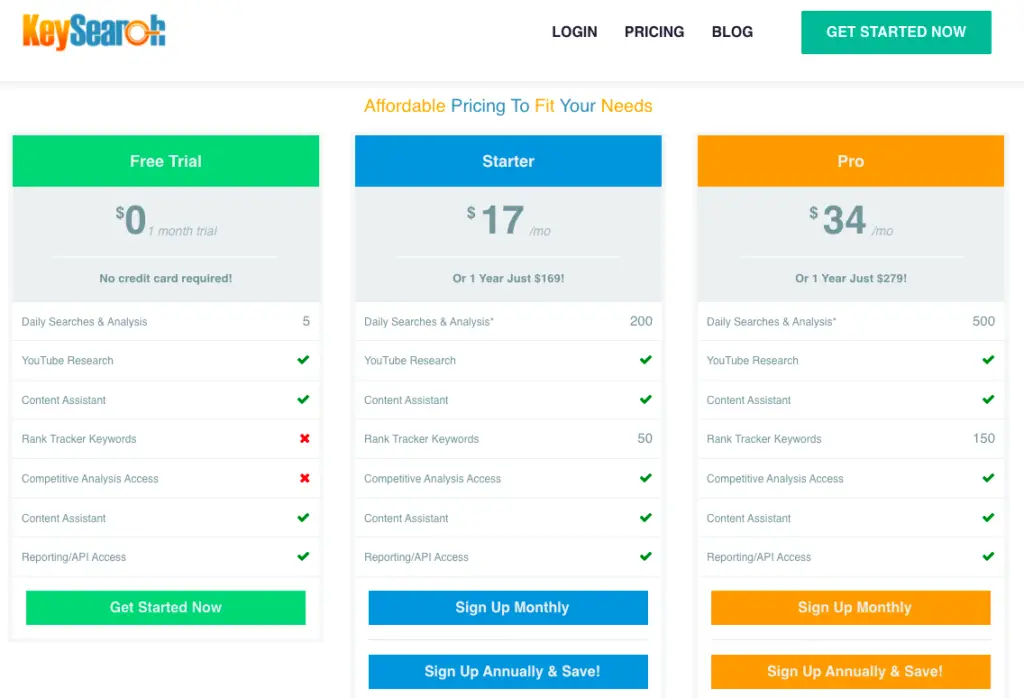
KeySearch is Cheap, But is it Worth the Money?
If you need a keyword tool that does all the basics really well with a few advanced features, then KeySearch is not only worth the money, it’s a no-brainer.
I have used KeySearch for multiple eCommerce stores as well as this blog and it does everything I need it to. I’ll cover the main features I use it for below.
Although the price is only $13 a month with the discount code, it may still be an unnecessary expense for many people. If you only need to do a few keyword searches a month and have no use for the additional features, you could manage with a free tool.
If this sounds like you, Uber Suggest has a keyword search volume tool that you can get a couple of free searches, however, you can’t search for the keyword volume worldwide. You can only search for each individual country for some reason.
I also have a full list of keyword tools and their prices here if you want to check them out.
KeySearch’s Keyword Research Tool Feature
The keyword research feature will most likely be the tool you use the most. You simply type in your search term into the search bar and you will receive a whole lot of useful information.
In the example below, I have searched the keyword “rooftop tents” by all locations. As you can see this term is searched 165,000 times per month. I am also given a huge list of related search terms, the list goes on far more than you can see on my screenshot.
The score on the right is very important to be aware of, this tells you how difficult a search term is to rank on Google. The lower the score the easier it will be to rank for that keyword. The goal is to find a combination of reasonably high search volume with a low score.
For example, “hard shell roof top tent” is an example of a keyword worth pursuing, it has a score of 26 with a search volume of 27,000.
Being aware of search volume fluctuations throughout the year may be important depending on your goals as many search terms will be seasonal. It’s important to filter for specific countries to get a more accurate view of seasonality. Because each country has different seasons, searching worldwide may show a slightly misleading view of seasonality.
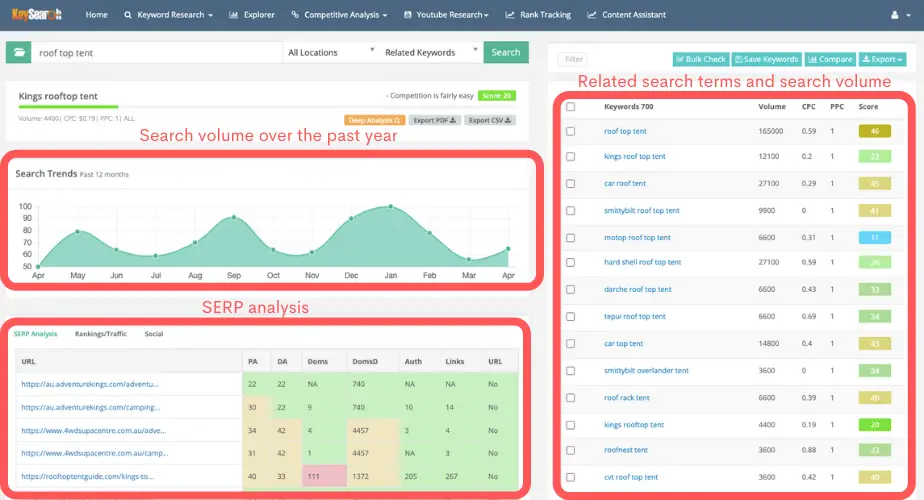
Above you can see the SERP (Search engine results page) for the search term “rooftop tent”. You will then be given an analysis of each website including their domain authority, how many links they’re receiving, how often they use the keyword in their article and if the keyword is in their URL.
This is extremely useful information. Always remember, the answer to ranking on page 1 of Google is on the websites on page 1 of Google, so take notice of these analytics.
Use KeySearch’s Filter Feature
Because the data on the right side of the KeySearch dashboard is probably the information you will use the most, it’s important to know how to use it correctly. Utilizing the filter is essential and can save you a lot of time in searching through hundreds of related keywords.
By clicking on the headings above the listed keywords you can filter the results in order. For example, in the image below I have clicked on the score heading which has listed all the search terms by the ease of ability to rank. As a beginner, I would only be going after these easy to rank keywords.
Long-tail keywords are search terms that don’t have the same demand as other more popular keywords but will be far easier to rank for in the early stages. By utilizing the other filter indicated with the arrow it will be easier to find available long-tail keywords.
You can input the keywords you want, the negative keywords you don’t want, how many words you want the long-tail term to include as well as some other features. This will provide you with a list of long-tail keywords on a silver platter.
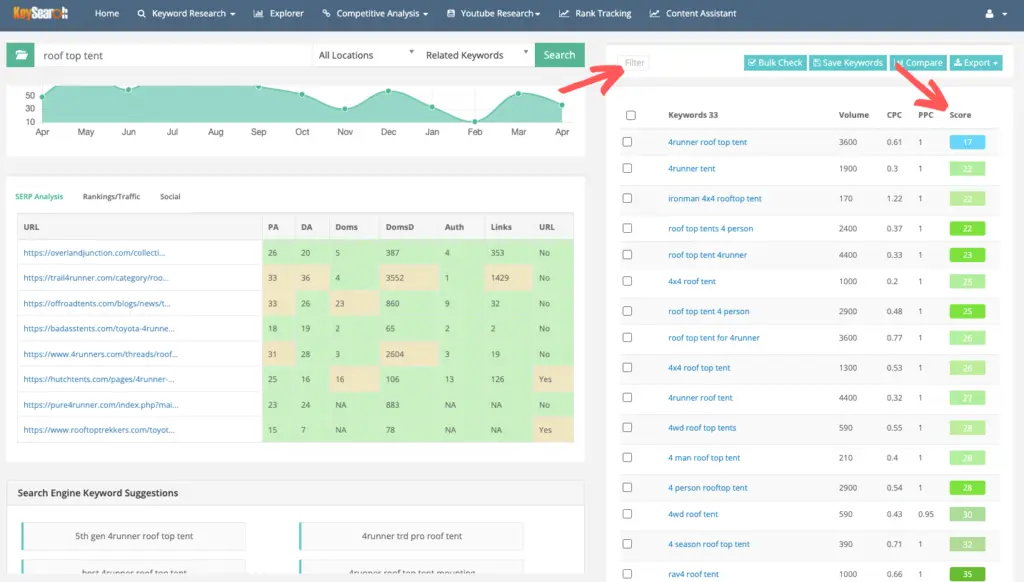
Is KeySearch Good for Bloggers?
Keyword tools are an asset for bloggers for so many reasons. Bloggers can still be successful without one but it will require a lot more guesswork. A keyword tool is like having a fish finder for a fisherman.
If you’re a beginner to blogging or your blog isn’t bringing you in the big dollars yet, KeySearch will be all you need. I can’t imagine that you will be requiring additional features for your blog that KeySearch does not provide.
If you have a reasonably new blog, finding underserved topics to write about is the goal. New blogs simply can’t compete in the early stages for competitive keywords against authoritative websites. KeySearch will help you find the underserved topics you require.
The filter feature will provide you with copious amounts of long-tail keywords for your topic. Not to mention, provide you with many underserved related keyword ideas you wouldn’t have come up with without this tool.
Sifting through the related keywords to your search is one of the best ways to find articles to write. You can simply just type in any word related to your niche and get hundreds of article ideas. If you’re doing reviews on your website, you will often get a plethora of different brands listed which can be used for reviews or comparison posts.
I believe KeySearch is best for websites that have fewer than 200 articles. Once your website has several hundred articles and is bringing in a decent income, you could look at upgrading.
Is KeySearch Good for Ecommerce Store Owners?
Keyword tools are primarily used by bloggers, however, eCommerce store owners can get just as much use out of them. If an eCommerce store has a blog you can get all the obvious benefits in finding content within your niche.
Keyword tools can go a long way in helping you decide which products or niches to sell. When deciding on a product or niche to sell online, knowing the demand beforehand is essential!
One of the best ways to find gaps in the market is to find already successful stores selling specific products in the US only. You can then use KeySearch to check the demand for those products in other countries.
Many eCommerce store owners target the big 4 countries which are the US, the UK, Canada and Australia. They often neglect other countries which leaves plenty of opportunities open around the world.
For example, I have used the search term “Roof Top Tents” filtering the results for Germany only. As you can see, Germany searches this term 1,600 times a month. You can go through many countries like this, check the search volume and see how many ads for these products are targeting these countries.
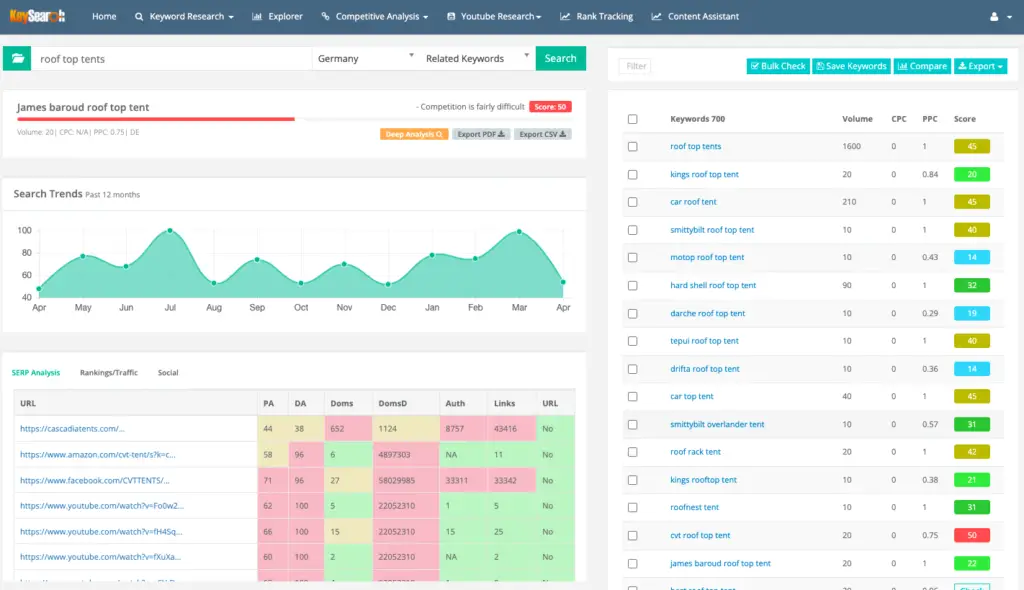
By searching for products in KeySearch, you also receive PPC and CPC information. CPC (Cost per click) is important to take notice of, this will give you an estimate of how much it will cost to advertise to each country.
Because most advertising platforms use a bidding system to determine the price of specific products, it’s important to know if the product you plan to sell is a viable option and knowing the advertising cost is a large part of that.
KeySearch Explorer Feature
KeySearch has an explorer feature to provide a deep analysis of much of the backend information of a website. This feature can be used for your own website or competitor websites.
If you’re not a tech-savvy person this is ideal. It’s laid out in an easy to understand dashboard and provides much of the important data that you need to be aware of to improve your SEO.
As you can see below, I’ve put keysearch.co into the search bar to receive an analysis of their website. You receive the following information:
- Domain Strength
- Keyword scores you should target
- Backlinks
- Referring Domains
- Organic keywords
- Top competitors
- Top referring domains
- Ranking distribution
- Anchor texts
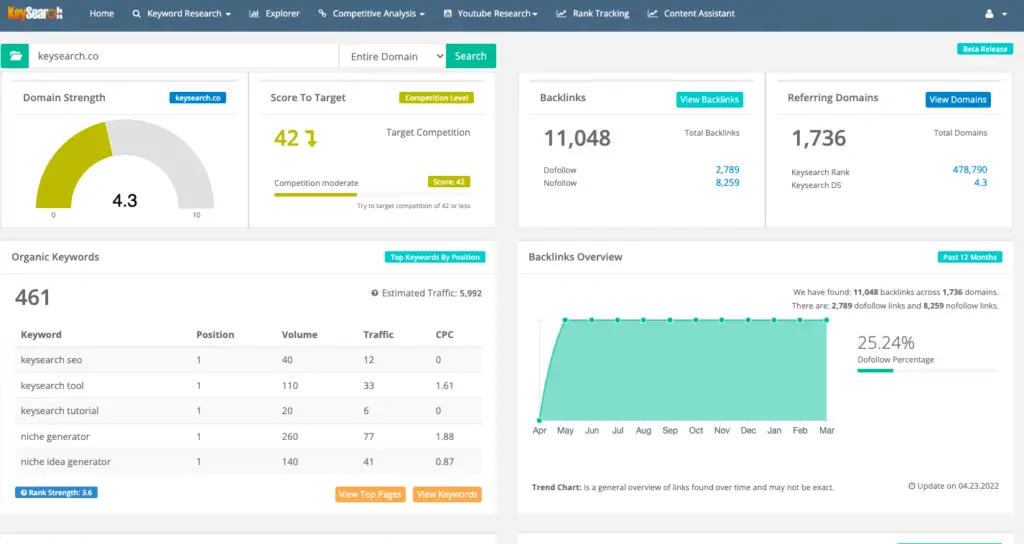
This content is especially helpful for new websites. Take notice of the “score to target” section. This ensures you write content on keywords that you are actually able to rank for instead of wasting time writing content that simply won’t rank until you have increased your domain authority.
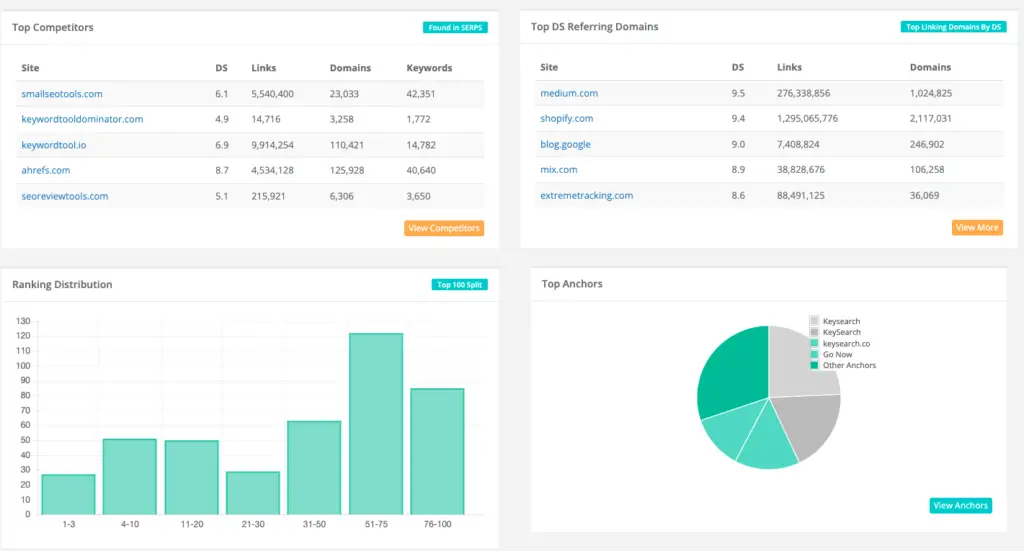
Who Should Not Use KeySearch?
If you only need to do a few searches then you may get away with using a free keyword tool to get your results and you can manage without KeySearch.
Many people (me included) like to do all their keyword research for a new website in the beginning stages then there is little use for the tool. If this is you I’d recommend paying for a single month for $13 with this link and using the code KSDISC then canceling it before the month is out.
KeySearch’s capabilities would be too limited for SEO agencies and large websites with thousands of articles and a lot of competition. Paying hundreds of dollars a month to Ahrefs or SemRush is worth it for these websites.
If you plan to do technical audits on your website, KeySearch may not provide an adequate amount of information to do so. The more advanced tools will provide all the information you need for broken links, core web vitals, website speed and the list goes on.
Are KeySearch’s Results Accurate?
This is an interesting question and one you may not have considered. All Keyword research tools are basing their results on the information they are receiving. I really don’t believe Google is sharing its data with these tools, which begs the question is KeySearch’s data accurate?
I have used several Keyword tools and compared the results between them for multiple search terms. In my experience, the results all vary a little but are generally in the same ballpark. The fact that they all vary makes me think they are all receiving slightly different data.
I have come across a couple of keyword tools that do seem to differ greatly from the rest. I don’t want to call them out as it’s entirely possible their results are accurate and the rest are wrong. Or it may just be the search terms I used that vary.
However, I tend to trust a tool more if its results are closely related to the majority, especially when it matches the results of the best and most expensive tools.
KeySearch results tend to be similar to most of the other keyword tools which make me feel more confident that the results are likely to be more accurate. If I felt like the results were not accurate, I wouldn’t use or recommend KeySearch.
Pros of KeySearch
- Definitely one of the best value keyword tools available.
- Easy to find low competition keywords.
- A great option for YouTubers to help find the best keywords to target.
- Competitor analysis shows what you need to do to compete.
- Really good filter feature to find those long-tail keywords.
- Provides many ideas to write content about.
- Very simple and easy to understand. Beginners won’t have any trouble navigating the dashboard.
Cons of KeySearch
- It has fewer in-depth features than keyword tools such as, Ahrefs and KW Finder.
- The yearly plan is only slightly cheaper than the month-to-month plan.
- No phone or live chat options.
- Like any Keyword tool, I really don’t know how accurate some of the results are.
- The free trial is fairly limited.
Summary
Although KeySearch may not be the right tool for everyone, I’m actually surprised more people don’t use it. For the price, it’s an extremely useful tool that most people with a website would benefit from.
If it helps you come up with one uncompetitive piece of content to write about then it has already paid for itself.
If you’re on the fence about getting KeySearch, I’d recommend pulling the trigger and paying for a month. There is no need to pay for a year upfront as it’s not that much cheaper anyway.
Click this link below and use the code DSDISC for a 20% discount. Why pay full price if you don’t have to! Happy searching!!
KeySearch Review

KeySearch is the best value method of improving SEO for keyword research and monitoring the demand for specific search terms.
Product Currency: USD
Product Price: 17
Price Valid Until: 2023-12-31
Product In-Stock: InStock
4





Leave a Reply